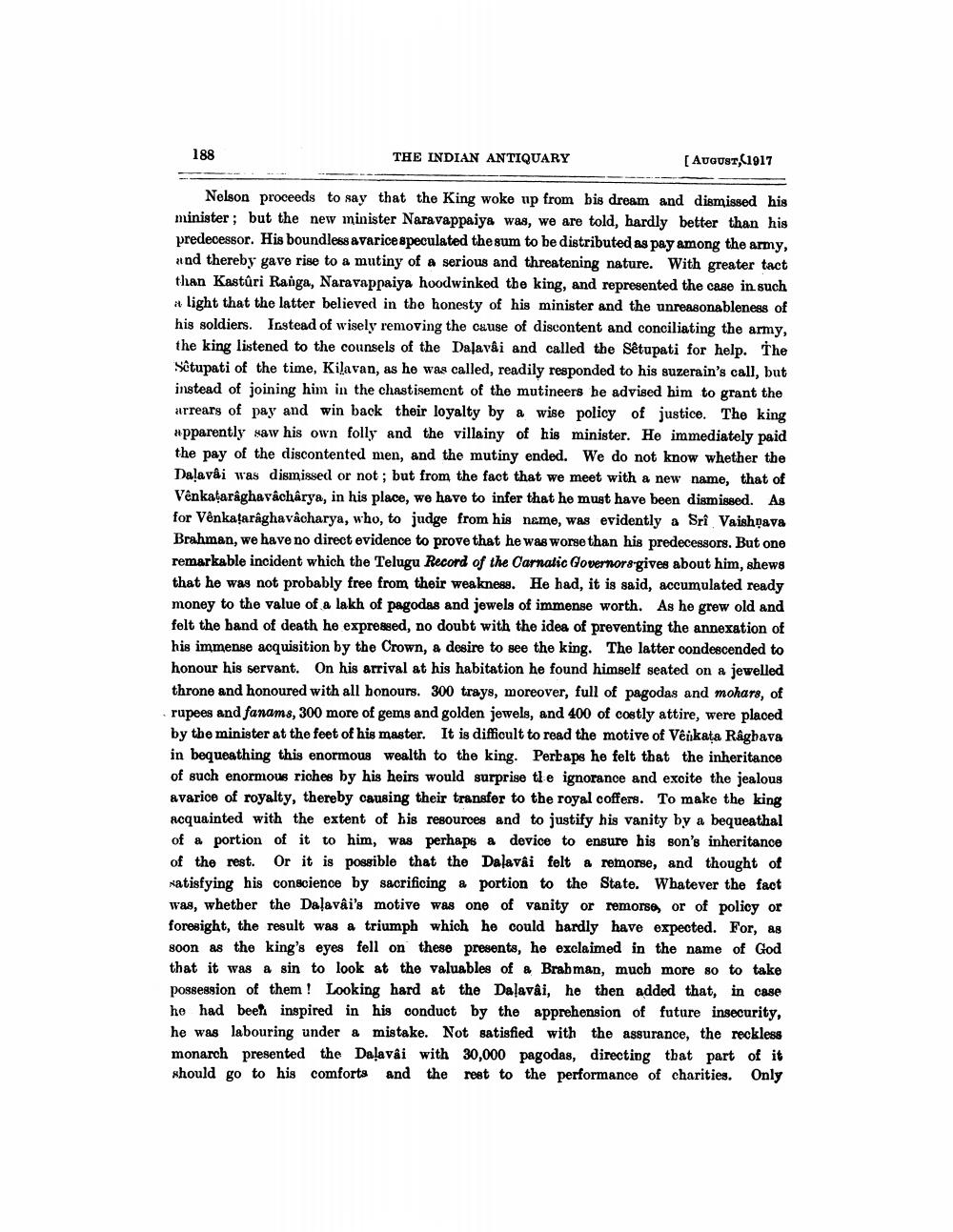________________
188
THE INDIAN ANTIQUARY
(Avaust, 1917
Nelson proceeds to say that the King woke up from bis dream and dismissed his minister ; but the new minister Naravappaiya was, we are told, hardly better than his predecessor. His boundless avarice speculated the sum to be distributed as pay among the army, and thereby gave rise to a mutiny of a serious and threatening nature. With greater tact than Kasturi Ranga, Naravappaiya hoodwinked the king, and represented the case in such #light that the latter believed in the honesty of his minister and the unreasonableness of his soldiers. Instead of wisely removing the cause of discontent and conciliating the army, the king listened to the counsels of the Daļavâi and called the Setupati for help. The Setupati of the time, Kilavan, as he was called, readily responded to his suzerain's call, but instead of joining him in the chastisement of the mutineers be advised him to grant the arrears of pay and win back their loyalty by a wise policy of justice. The king apparently saw his own folly and the villainy of his minister. He immediately paid the pay of the discontented men, and the mutiny ended. We do not know whether the Dalav&i was dismissed or not; but from the fact that we meet with a new name, that of Venkataraghavacharya, in his place, we have to infer that he must have been dismissed. As for Venkataraghavacharya, who, to judge from his name, was evidently a Sri Vaishọava Brahman, we have no direct evidence to prove that he was worse than his predecessors. But one remarkable incident which the Telugu Record of the Carnatic Governors gives about him, shews that he was not probably free from their weakness. He had, it is said, accumulated ready money to the value of a lakh of pagodas and jewels of immense worth. As he grew old and felt the band of death he expressed, no doubt with the idea of preventing the annexation of his immense acquisition by the Crown, a desire to see the king. The latter condescended to honour his servant. On his arrival at his habitation he found himself seated on a jewelled throne and honoured with all honours. 300 trays, moreover, full of pagodas and mohars, of rupees and fanams, 300 more of gems and golden jewels, and 400 of costly attire, were placed by the minister at the feet of his master. It is difficult to read the motive of Venkata Raghava in bequeathing this enormous wealth to the king. Perhaps he felt that the inheritance of such enormous riches by his heirs would surprise the ignorance and excite the jealous avarice of royalty, thereby causing their transfer to the royal coffers. To make the king Acquainted with the extent of his resources and to justify his vanity by a bequeathal of a portion of it to him, was perhaps a device to ensure his son's inheritance of the rest. Or it is possible that the Dalavâi felt a remorse, and thought of satisfying his conscience by sacrificing & portion to the State. Whatever the fact was, whether the Daļavâi's motive was one of vanity or remorse, or of policy or foresight, the result was a triumph which he could hardly have expected. For, as soon as the king's eyes fell on these presents, he exclaimed in the name of God that it was a sin to look at the valuables of a Brahman, much more so to take possession of them! Looking hard at the Daļavâi, he then added that, in case he had beef inspired in his conduct by the apprehension of future insecurity, he was labouring under & mistake. Not satisfied with the assurance, the reckless monarch presented the Daļavâi with 30,000 pagodas, directing that part of it should go to his comforts and the rest to the performance of charities. Only




